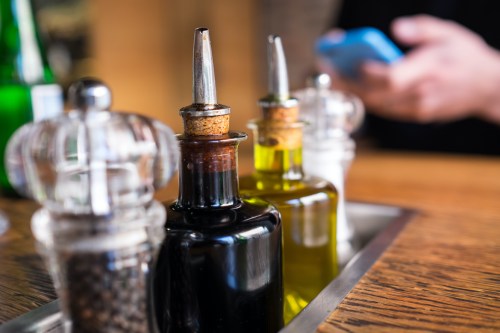Does Vinegar Really Go Bad After Its Expiration Date? Here’s What To Know About Its Long Shelf Life
Ever wonder "Does vinegar go bad?" Here, a nutritionist advises on what expiration dates on vinegar mean and whether they're worth following.

Vinegar is a great pantry staple that comes in many forms (apple cider, white, balsamic, etc), and has many uses, including as cooking ingredient, digestion aid, and cleaning must-have. But have you ever been ready to mix it with extra virgin olive oil to drizzle over a bed of greens only to wonder to yourself: Does vinegar go bad? Because I have no idea how long I’ve had this bottle.
Experts in This Article
registered dietitian based in Westchester County, New York
Well, long answer short: While the ingredient typically has a shelf life that can last years, it does have an expiration date on the bottle. Using it past its expiration can translate to a compromised freshness, quality, and potency. But, as to whether vinegar goes bad in the sense that it may harm you, the answer is no—consuming expired vinegar is very unlikely to lead to any health- or safety-compromising effects.
Below, a nutritionist breaks down what you should know regarding vinegar’s shelf-life timeline in terms of freshness, quality and potency as it nears its expiration date and beyond.
Breaking it down: Does vinegar actually go bad after its expiration date?
Vinegar is typically made from water and acetic acid, and “most vinegars contain between 4 to 8 percent acetic acid,” says nutritionist Ilyse Schapiro MS, RD, CDN. For example, white vinegar is comprised of acetic acid (about 5 percent) and water (about 95 percent), so, the acetic acid content is a lot smaller than the water content.
To clarify, while the liquid does indeed expire, the expiration date mostly refers to its acidity level decreasing, making it less potent and effective, but not less safe to consume. For this reason, vinegar does not really go bad, per se, and can be used beyond its shelf life without harm. “Because of its makeup, it has an indefinite shelf life, and you can use vinegar long after its expiration date,” Schapiro says.
“Because of its makeup, vinegar has an indefinite shelf life, and you can use vinegar long after its expiration date.” —Ilyse Schapiro, RD, CDN
So, what happens when you consumer the ingredient after it expires? Well, good news again: According to Schapiro, not a whole bunch happens at all. “It is not dangerous to eat expired vinegar, but it may not taste as strong, and the color may change—it may be a little cloudy—but there will not be any side effects,” she says. Typically within two to three years post expiration date you may see changes in the color, but the change isn’t harmful so much as just potentially undesirable.
“Typically, vinegar is best from one to three years after opening or two to five years prior to opening it. In general, the expiration date will be listed as being about two to three years past the estimated purchasing date of the product,” says Schapiro. Then tack on those added years—unopened or opened—to make the most of your bottle and get the greatest bang for your buck.
That said, if you are using the vinegar that’s reached its expiration date and beyond to cook, the recipes likely won’t taste as good as they would with fresher stuff.
Benefits of vinegar, and how to enjoy it best
Considering all the reasons to put your bottle of vinegar to good use and enjoy it, there isn’t so much of a reason to even worry about whether vinegar can go bad. You’ll likely polish it off before you even get to that point.
“Vinegar has health benefits, like antibacterial properties, plus it contains antioxidants, where it may aid in blood-sugar control and may lower cholesterol,” she says. “What’s more, vinegar contains probiotics, which is great for gut health.” Probiotics can help keep good gut bacteria present and lower prevalence of bad bacteria in the gut, and they can also contribute to upholding a strong immune system to keep you strong and well.
What you eat affects your gut too. Watch the video to see how:
You can use the ingredient in your salads, to pickle foods (this is great for whipping up probiotic-rich, fermented and pickled veggies, for example), and you can even glaze your veggies with it, along with some other ingredients to counteract the sour taste of vinegar like honey, maple syrup, nuts or seeds, and shaved or crumbled cheese.
How to store your bottle to keep it fresh as long as possible
Since post-expiration-date vinegar will lose its flavor and potency and become poorer quality as it degrades, it can help to know some tips for extending the life of your bottle. Here are a few best practices to keep in mind to prolong vinegar’s shelf life and help you maintain its flavor, texture, and, of course, its strong nutrition profile.
- Keep your unopened bottle away from direct sunlight.
- Store your bottle in a cool, dark place, such as in your pantry or a kitchen cabinet. This will keep those sun rays away and prevent the vinegar from becoming overheated.
- Once opened, keep your vinegar in its original container. Do not transfer it elsewhere.
- Put back the lid or cap immediately after using. Don’t let it sit out without a covering. Simply return it to the pantry until you’re ready for your next use.
Bottom line? Abiding by the expiration dates on bottles of vinegar will help you ensure yours is the most potent and flavorful, but it doesn’t actually go bad.
Sign Up for Our Daily Newsletter
Get all the latest in wellness, trends, food, fitness, beauty, and more delivered right to your inbox.
Got it, you've been added to our email list.










